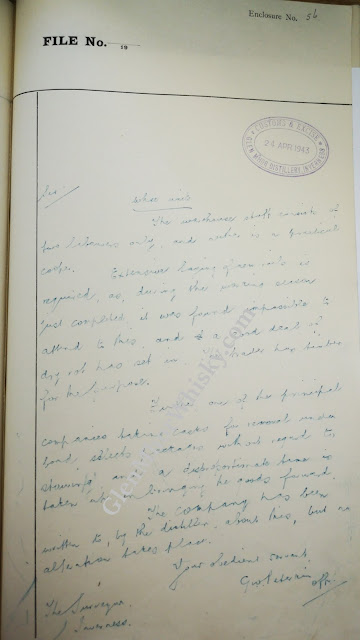Glen Mhor Log Book 24th April 1943
The war distilling restrictions have mothballed distilleries across Scotland. At Glen Mhor, a new daily routine is taking form with Customs & Excise Officer, Gilbert W. Peterkin, providing a unique insight into his situation.
We know that distilling ended on the 26th March 1943, making Glen Mhor one of the last - if not the last - distillery to shut its doors. We'll probably never know for sure, as specific dates of closure are rarely publicly available. I'm sure they are somewhere, much like our finds in a dusty ledger, diary or logbook. However, most publications list distilleries shutting up shop in 1941 or 1942. This certainly wasn't the case in Inverness.
For Gilbert, we've seen in an earlier entry, just 2 days prior to this summary, his truly revealing outline and concerns at his new working environment and conditions. These entries give us a new appreciation of the war conditions at distilleries. Many wrongly believe that when a distillery was mothballed during the way, that was essentially it, but that wasn't the case as maturing stock would still be sold (under strict conditions) and a workforce was required to oversee such a practice and maintain security.
Here, Gilbert gives us insight into the practicalities of the new order and even the most straightforward of tasks aren't without their problems.
'Sir,
Whse units
The warehouse staff consists of two labourers only, and neither is a practical cooper.
Extensive laying of new rails is required, as, during the working season just completed it was found impossible to attend to this, and a good deal of dry rot has set in. The trader has timber for the purpose.
Further one of the principal companies taking casks for removal under bond selects packages without regard to stowing and a disproportionate time is taken up in bringing the goods forward.
The company has been written to, by the distiller, about this, but no alteration takes place.
Your obedient servant,
G.W. Peterkin, officer
The surveyor
Inverness'
The entry gives us several features of note, with Mackinlay & Birnie still playing a role and dealing with a rogue company that isn't following the best protocol. You could debate whether the trader is only selecting the best casks in their view for selling and that's why they have little regard as to their location on site and within a specific row. Gilbert is defending the two labourers that form the mothball team, trying to minimise the work that is required for extracting casks from warehousing.
I'm presuming by rails he isn't meaning trains, as Glen Mhor didn't have any access to the railway line that Glen Albyn was blessed with. No here, it is likely he's referring to the racks within the warehousing, and given these warehouses were all constructed in the 1890s, after 50 years of thereabouts, some maintenance work is overdue.
Also hinted, is the limited skillset of the team. A fully trained cooper is a skilled occupation and as our trio would know, casks do need repairing in warehouses for a variety of reasons. These can be triggered by the moving of casks or even temperature fluctuations. Simple things that can have a knock on effect and then require intervention. So, there is the potential for loss, the loss of whisky, and in doing so, vital revenue to the Crown. After all, with no distilling, the inventory is all that there is and it must be preserved as best as possible.
Another unique insight into the war years, I wonder what's next?
This Log Book comes from the Highland Archives Centre (HCA/D31/4/1/25) and is watermarked for its protection. As with any images on this website, please ask first before using and always give credit.


Comments
Post a Comment